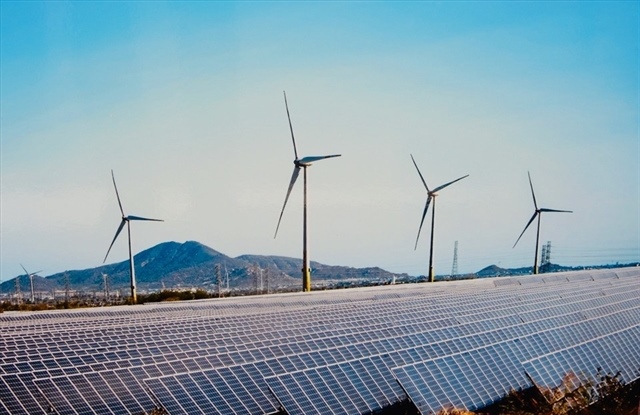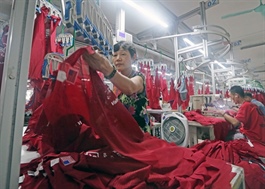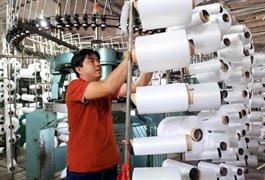Private sector should be well-prepared for carbon market launch
Private sector should be well-prepared for carbon market launch
Recent survey findings suggest that local businesses remain unevenly prepared, with experts urging the government to roll out clearer guidance and stronger support mechanisms.

Solar and wind power systems in Ninh Thuận Province. — Photo laodong.vn |
With Việt Nam set to pilot its domestic carbon market in 2025, the role of private sector participation has emerged as a critical factor in ensuring the market’s effectiveness and sustainability.
Yet recent survey findings suggest that local businesses remain unevenly prepared, with experts urging the Government to roll out clearer guidance and stronger support mechanisms.
According to a survey by the International Finance Corporation (IFC) in collaboration with the Ministry of Agriculture and Environment's Department of Climate Change in late 2024, firms are still facing multiple barriers to participating in the carbon market, especially the voluntary carbon market (VCM).
Among the sectors surveyed, the F&B industry showed the highest level of preparedness, mainly due to pressure from international supply chains and mandatory greenhouse gas (GHG) inventories.
The livestock sector ranked second, partly supported by the National Biogas Programme. In contrast, rice and waste management, despite their high emission reduction potential, are still lagging in terms of measurement, reporting and verification (MRV) capabilities, which are essential prerequisites for entering the carbon market.
Notably, the percentage of businesses conducting GHG inventories remains low – only around 10 per cent in the rice sector and close to 40 per cent in waste management. Even in the relatively advanced F&B sector, full MRV implementation, including third-party verification and Scope 3 assessments (supply chain emissions), remains limited.
A key challenge cited by firms is a lack of understanding of carbon markets and international certification standards. Many businesses report being unclear about how to register carbon credit projects, navigate certification procedures or meet recognised emission reduction metrics.
As a result, most companies currently prefer to focus on the upcoming mandatory domestic carbon market rather than more complex international schemes such as Verra or Gold Standard.
On a more optimistic note, most businesses surveyed recognise the revenue potential of carbon credits. Successful models like TTC AgriS and Husk Ventures have launched pioneering projects that treat carbon credits as strategic assets within a green economy framework.
However, these firms also stress the urgent need for legal clarity, credit recognition mechanisms and initial financial support to scale such initiatives.
Another critical technical factor is digital MRV readiness, which remains rudimentary. Most businesses lack trained staff and integrated data systems for digital monitoring, directly impacting the transparency and certifiability of carbon projects.
To address these challenges, the IFC and the Ministry of Agriculture and Environment have issued a set of recommendations, including: issuing sector-specific technical guidance for GHG inventories and mitigation; establishing sectoral training programmes; promoting green finance; and encouraging a carbon labelling scheme for compliant products. Developing a national digital MRV platform and improving workforce capacity are also identified as urgent priorities.
With the launch of a national carbon trading platform expected in 2025, Việt Nam is approaching a pivotal moment. Without strong and proactive private sector engagement, the carbon market’s long-term viability could be in jeopardy.
Conversely, with the right support, it may offer Vietnamese businesses a golden opportunity to embrace green transformation, enhance competitiveness, and integrate deeper into global value chains.
- 08:28 14/04/2025
























